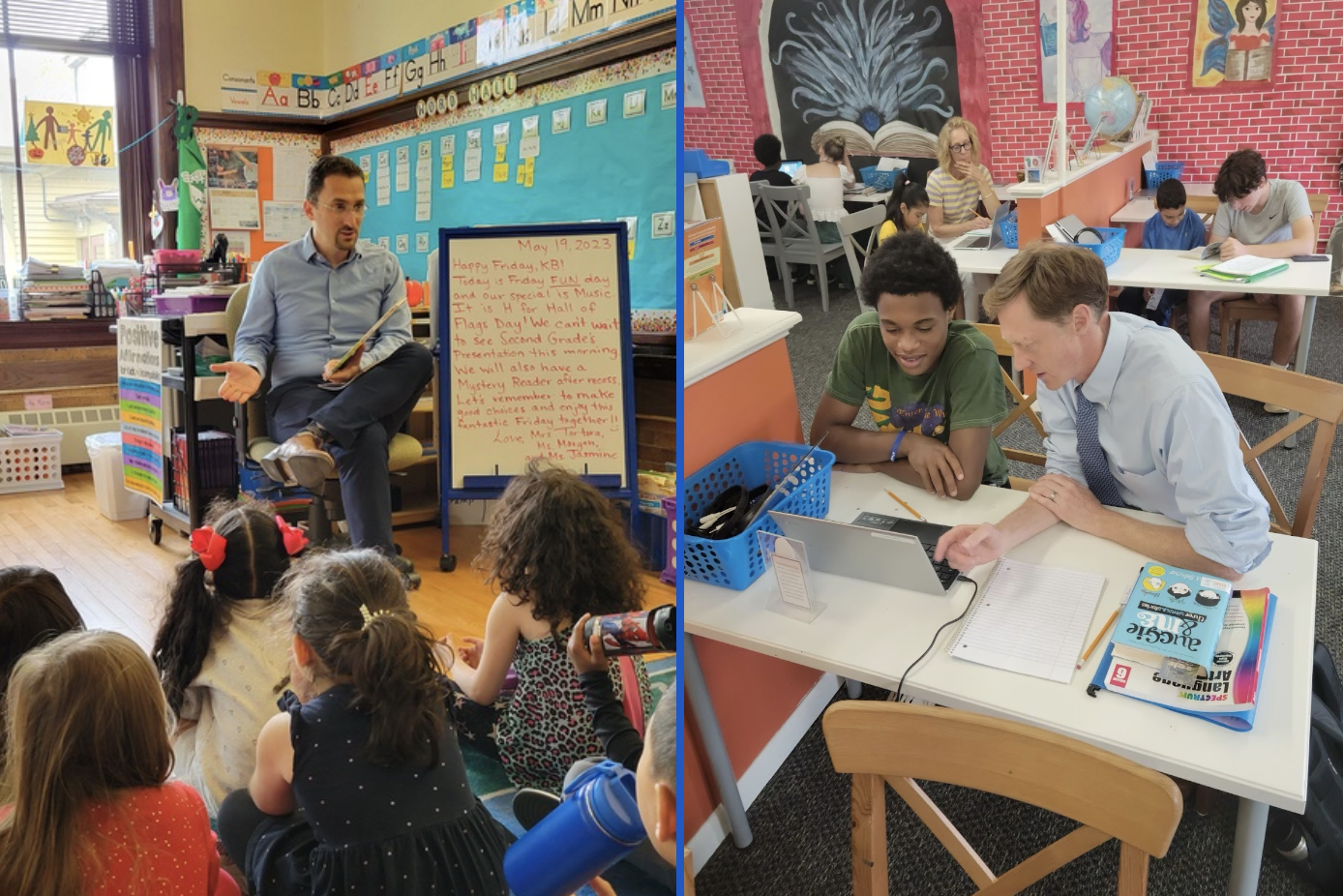Elicker and Goldenberg clash over education policy
Mayoral candidates Justin Elicker and Tom Goldenberg spoke with the News about their plans to address absenteeism and literacy rates.

Courtesy of Tom Goldenberg and Justin Elicker
New Haven Mayor Justin Elicker will face Republican and Independent candidate Tom Goldenberg in Tuesday’s mayoral election, and public education has emerged as one of the top issues in the race.
The News spoke with both candidates about their proposals for New Haven Public Schools ahead of Tuesday’s election.
With another term, Elicker said that his biggest focus in terms of education would be improving literacy rates and tackling absenteeism. The absentee rate in the 2022-2023 school year was 36.6 percent in New Haven. He also said that the challenges New Haven faces are part of a structural, historical issue of being underfunded, which he said complicates efforts to support New Haven schools that might need more support than their suburban counterparts.
“Our long-term vision needs to be that New Haven Public Schools is a place where every child has every opportunity to thrive,” Elicker said. “Like any parent, I want my kids to have every opportunity to succeed, to feel safe and embraced in the public school system.”
Elicker said that he sees the unanimous approval of Superintendent Madeline Negrón as a significant step toward this improved reality of working to address literacy and absenteeism. He said that the city has brought on more “dropout prevention specialists” to investigate the causes and ways to engage absent students.
He also said there have been efforts from the superintendent’s team to communicate with families directly about the importance of student attendance. According to Elicker, absenteeism in the city is also impacted by vaccination requirements. To address this concern, he said that there is a partnership with the city’s health department to eliminate any vaccine-related barriers that might be contributing to students’ absences.
Candidate Tom Goldenberg spoke primarily about his goals to decrease absenteeism rates in public schools. He said that officials often blame the COVID-19 pandemic for the high number of dropouts. Although he said he does not discredit the role COVID-19 played in the issue, he thinks that other aspects that are within the school system’s control might influence the absenteeism numbers.
Alder Eli Sabin, who represents Ward 7 in downtown New Haven and previously served as alder for Ward 1, added that officials should look at the budget for the school system, which he said will define the success of initiatives to address issues like absenteeism and literacy.
“Our literacy and math scores have been down the last couple of years, and we’ve been investing a lot in tutoring and just improving our curriculum to try to make sure our kids can catch up to where they were before the pandemic,” Alder Eli Sabin ’22 said. “And obviously, we want them to be doing even better than that.”
Improving literacy rates is another focus for Elicker. He mentioned that besides the $8 million investment in the the school system’s literacy programs, there is also a tutoring initiative that partners with The Boys and Girls Club, Leap, New Haven Reads and other organizations to make literacy development a priority. According to Elicker, over the summer, these programs tutored more than 400 students, and students are showing promising improvement.
Over his four years in office, Elicker said he believes his administration made a lot of progress in education but that he believes there is still a lot to come.
Goldenberg disagreed with Elicker’s assessment of his administration work.
“For us to be worse in the state [in the number of absenteeism] is a real accomplishment in the wrong direction,” Goldenberg said.
In the 2021-2022 school year, New Haven had the highest rate of absenteeism, 58.1 percent, but the rate has fallen to 36.6 percent, which is lower than Hartford’s.
Goldenberg said his two primary focuses are to develop career pathways and parent engagement programs. He said that out of 44 schools, eight have parent engagement programs and said that is crucial to expand this number to every one of the schools.
He also would create a liaison in the mayor’s office to establish a “parent university” to provide parents with the resources they need to support their children’s journey in public school. He said that he believes one of the biggest issues today in terms of education is that parents feel unsupported.
“I want to be a mayor who is hands-on and engages with the school system, who utilizes the influence the mayor has in making appointments on the Board of Ed and sitting on the Board of Ed to make sure that we are living up to the high standards of rigor, transparency and accountability,” he said.
According to Goldenberg, the career pathway proposal comes from his own personal experience as he said that some of the jobs he has worked were not related to the formal education he had received. He said he wants a system that exposes students to various career options and opportunities from a young age. Goldenberg said that he envisions schools that give students more internships, apprenticeships and certifications for skills that they can directly use in the workforce as soon as they graduate from high school. He said that he believes this would make people more engaged in education since pursuing a college degree is still not accessible for a large proportion of people.
Elicker also spoke about establishing a career-driven program, saying that $8 million was dedicated to creating a Career Pathways High School for students who choose not to go to a typical four-year college program.
“It’s very important to make sure that we make a promise to every New Haven child, those that are intending to go to college and those that choose not to,” he said. “And this initiative is part of fulfilling that promise to all New Haven youth.”
The mayoral election will be held Nov. 7.







